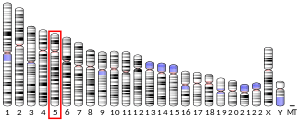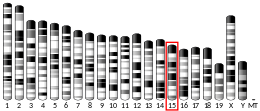CDH12
Cadherin-12 is a protein that in humans is encoded by the CDH12 gene.[5][6]
This gene encodes a type II classical cadherin from the cadherin superfamily of integral membrane proteins that mediate calcium-dependent cell-cell adhesion. Mature cadherin proteins are composed of a large N-terminal extracellular domain, a single membrane-spanning domain, and a small, highly conserved C-terminal cytoplasmic domain. Type II (atypical) cadherins are defined based on their lack of an HAV cell adhesion recognition sequence specific to type I cadherins. This particular cadherin appears to be expressed specifically in the brain and its temporal pattern of expression would be consistent with a role during a critical period of neuronal development, perhaps specifically during synaptogenesis.[6]
References
- 1 2 3 GRCh38: Ensembl release 89: ENSG00000154162 - Ensembl, May 2017
- 1 2 3 GRCm38: Ensembl release 89: ENSMUSG00000040452 - Ensembl, May 2017
- ↑ "Human PubMed Reference:".
- ↑ "Mouse PubMed Reference:".
- ↑ Selig S, Bruno S, Scharf JM, Wang CH, Vitale E, Gilliam TC, Kunkel LM (Jun 1995). "Expressed cadherin pseudogenes are localized to the critical region of the spinal muscular atrophy gene". Proc Natl Acad Sci U S A. 92 (9): 3702–6. doi:10.1073/pnas.92.9.3702. PMC 42029. PMID 7731968.
- 1 2 "Entrez Gene: CDH12 cadherin 12, type 2 (N-cadherin 2)".
Further reading
- Jean Weissenbach; Gyapay G; Dib C; et al. (1992). "A second-generation linkage map of the human genome". Nature. 359 (6398): 794–801. doi:10.1038/359794a0. PMID 1436057.
- Suzuki S, Sano K, Tanihara H (1991). "Diversity of the cadherin family: evidence for eight new cadherins in nervous tissue". Cell Regul. 2 (4): 261–70. doi:10.1091/mbc.2.4.261. PMC 361775. PMID 2059658.
- Gyapay G, Morissette J, Vignal A, et al. (1994). "The 1993-94 Généthon human genetic linkage map". Nat. Genet. 7 (2 Spec No): 246–339. doi:10.1038/ng0694supp-246. PMID 7545953.
- Tanihara H, Sano K, Heimark RL, et al. (1995). "Cloning of five human cadherins clarifies characteristic features of cadherin extracellular domain and provides further evidence for two structurally different types of cadherin". Cell Adhes. Commun. 2 (1): 15–26. doi:10.3109/15419069409014199. PMID 7982033.
- Selig S, Lidov HG, Bruno SA, et al. (1997). "Molecular characterization of Br-cadherin, a developmentally regulated, brain-specific cadherin". Proc. Natl. Acad. Sci. U.S.A. 94 (6): 2398–403. doi:10.1073/pnas.94.6.2398. PMC 20099. PMID 9122206.
- Kremmidiotis G, Baker E, Crawford J, et al. (1998). "Localization of human cadherin genes to chromosome regions exhibiting cancer-related loss of heterozygosity". Genomics. 49 (3): 467–71. doi:10.1006/geno.1998.5281. PMID 9615235.
- Chalmers IJ, Höfler H, Atkinson MJ (1999). "Mapping of a cadherin gene cluster to a region of chromosome 5 subject to frequent allelic loss in carcinoma". Genomics. 57 (1): 160–3. doi:10.1006/geno.1998.5717. PMID 10191097.
- Shimoyama Y, Tsujimoto G, Kitajima M, Natori M (2001). "Identification of three human type-II classic cadherins and frequent heterophilic interactions between different subclasses of type-II classic cadherins". Biochem. J. 349 (Pt 1): 159–67. doi:10.1042/0264-6021:3490159. PMC 1221133. PMID 10861224.
- Strausberg RL, Feingold EA, Grouse LH, et al. (2003). "Generation and initial analysis of more than 15,000 full-length human and mouse cDNA sequences". Proc. Natl. Acad. Sci. U.S.A. 99 (26): 16899–903. doi:10.1073/pnas.242603899. PMC 139241. PMID 12477932.
- Ota T, Suzuki Y, Nishikawa T, et al. (2004). "Complete sequencing and characterization of 21,243 full-length human cDNAs". Nat. Genet. 36 (1): 40–5. doi:10.1038/ng1285. PMID 14702039.
External links
- CDH12 human gene location in the UCSC Genome Browser.
- CDH12 human gene details in the UCSC Genome Browser.




